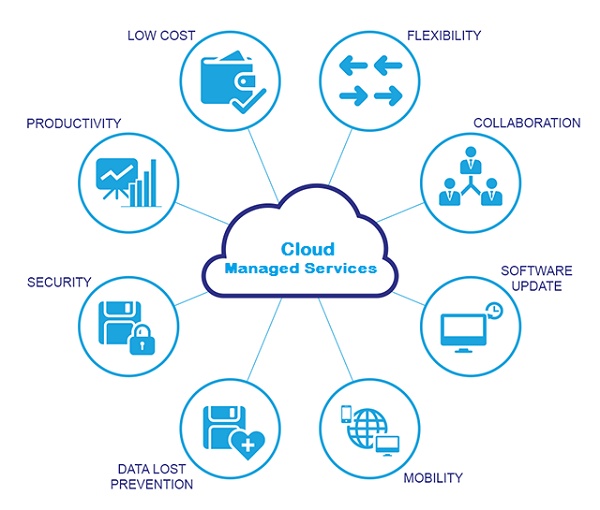In today's fast-paced digital world, businesses are increasingly turning to cloud-based solutions to manage their IT infrastructure. With the increase in the number of cloud service providers, enterprises now have access to a wide range of cloud consulting services, including cloud-managed services.
But what exactly are cloud-managed services and why are they essential for enterprises? In this blog post, we'll explore the basics of cloud-managed services , including what they are, how they work, and why enterprises need them.
What are Cloud Managed Services?
Cloud-managed services refer to the practice of outsourcing the management of a company's cloud infrastructure to a third-party service provider. These services include the management of cloud-based applications, data storage, security, and network infrastructure. By outsourcing these services to a cloud service provider, enterprises can focus on their core business activities while enjoying the benefits of a fully managed cloud infrastructure.
How do Cloud Managed Services Work?
Cloud-managed services and their dedicated workforce collaborate with enterprises and help them manage and maintain their cloud infrastructure. Some of their important services are mentioned below.
· Monitoring and Maintenance
Cloud-managed service providers monitor the health of a company's cloud infrastructure, ensuring that everything is optimal. They are responsible for performing regular maintenance tasks such as patching and updates. They are also responsible for keeping the infrastructure up-to-date and secure.
· Security and Compliance
Cloud-managed service providers implement and maintain security measures to protect the company's data and applications. They also ensure that the infrastructure is compliant with relevant regulations and standards.
· Backup and Disaster Recovery
The service providers leverage backup and disaster recovery solutions to ensure the safety of the company's data. They also make sure the data is protected and recoverable during an outage or disaster.
· Performance Optimization
They use proven techniques like load balancing and auto-scaling to optimize the performance of a company's cloud computing. Optimizing the company's cloud-based systems can improve overall competitiveness and enhance customer satisfaction.
Why do Enterprises Need Cloud Managed Services?
There are several reasons why enterprises need cloud-managed services. Here are some of the key benefits of the services:
· Expertise and Experience
Cloud-managed service providers have a team of experts with years of experience managing cloud infrastructure. By outsourcing the management of their cloud infrastructure to a service provider, enterprises can leverage the expertise and experience of these professionals.
· Cost Savings
Cloud managed services can help enterprises save money by reducing the need for in-house IT staff and infrastructure. By utilizing cloud managed services, enterprises can reduce the cost of hiring and maintaining a team of IT professionals.
· Scalability and Flexibility
Cloud managed services provide enterprises with scalable and flexible IT infrastructure. As the business grows and changes, the cloud infrastructure can be easily scaled up or down to meet the changing needs of the business.
· Improved Security and Compliance
Cloud managed service providers implement and maintain robust security measures to protect a company's data and applications. They also ensure that the infrastructure is compliant with relevant regulations and standards.
· Focus on Core Business Activities
Cloud managed services will enable enterprises to focus on their core business activities, rather than spending time and resources to manage IT infrastructure.
Conclusion
Cloud managed services provide enterprises with a range of benefits, including cost savings, expertise and experience, scalability and flexibility, and improved security and compliance.
By outsourcing the management of their cloud infrastructure to a third-party service provider, enterprises can enjoy a fully managed cloud infrastructure, which allows them to focus on what they do best - running their business.


No comments yet